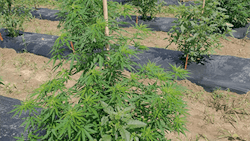Kentucky has become the latest state to explicitly permit the sale of cannabidiol (CBD) in food and cosmetics.
The state recently established the necessary registration and labeling requirements and approved steps for hemp-derived CBD as an additive.
The Kentucky Department of Health’s Division of Public Health Protection and Safety (Division) promulgated the regulation on Oct. 8 to ensure such products’ safety amid this market’s rapid growth. The Division argues that the rule is necessary to provide state businesses access to “one of the fasting growing manufactured food or cosmetic product markets.”
Kentucky joins a growing number of states across the country, including Texas, Florida, and Virginia, that have opted to create their own consumable CBD regulations as they await a broader framework from the U.S. Food and Drug Administration(FDA). The FDA still considers CBD illegal in most forms.
Guidelines
The regulation sets several guidelines to apply for the necessary permits to manufacture, market, sell, or distribute such products. The costs of manufacturing permits depend on risk levels as defined by state regulations, including how broadly the product is distributed and the manufacturing processes used.
Fees for inspecting a food manufacturing plant or food storage warehouse can be as high as $2,400 annually for a “high-risk plant.” For example, high risk includes food distributed in international, interstate, statewide, or regional commerce and manufactured as a ready-to-eat, time, and temperature-controlled product. The inspection fee for a “low-risk plant” product is $750, with low risk defined as products that are neither time nor temperature controlled.
Retail foodservice establishments offering food containing CBD additives must pay inspection and operation fees based on total square footage and seats in the establishment. For instance, inspection fees range from $75 for a business that is 1,000 square feet or less to $300 for a place of more than 30,000 square feet. Operation fees are $100 annually, plus an additional $60 for a business with 25 or fewer seats up to $175 if the establishment seats more than 200 people. Finally, the new CBD regulations dictate that companies manufacturing CBD cosmetics products must pay a $150 fee.
The CBD regulation also outlines product labeling requirements, packaging standards, and limits on advertising claims. For instance, the permit is non-transferable, must be renewed annually, and prohibits home-based processors. Labeling must, among other requirements, make clear that the product is within the federal legal limit of 0.3% THC levels. The state also prohibits advertising that includes “any implicit or explicit health claims stating that the product can diagnose, treat, cure, or prevent any disease.”
Additionally, any restaurant or other food service establishment offering hemp-derived CBD in finished food products must provide the following information to consumers upon request:
- The common name of the product.
- The manufacturer or distributor of the product.
- A statement that the product is within the federal legal limit of 0.3% THC levels.
Public Comments
The public can now offer written comments or attend a public meeting on the regulation. Public comments must be submitted by Dec. 31. Further details regarding the written comments and the public meeting can be found on page 6 of the rule.
The public meeting will take place on Dec. 21. Anyone looking to attend needs to notify the state in writing by Dec. 14. Those that do not attend can receive a transcript of the meeting by requesting it in writing.
The U.S. Hemp Roundtable (Roundtable) provided its comments for the rule on Oct. 26. While lauding the state’s decision, the Roundtable, founded in Kentucky and representing a group of hemp companies and organizations, sought clarification and changes on a few minor issues.
For example, the Roundtable seeks clarification on whether the state’s food or cosmetics plant operating requirements apply to retailers and out-of-state manufacturers. The group also seeks clarification regarding sufficient THC concentration labeling, whether CBD products sold in Kentucky must be manufactured in the state, and what tamper-proof packaging is allowed.


























